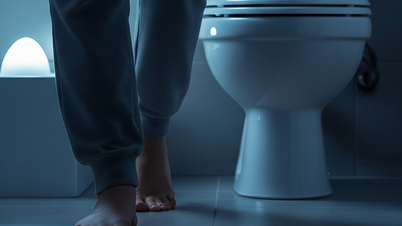Signs of people eating too much salt are water retention, swelling, frequent headaches, constant thirst, frequent urination and cravings for salty foods.
The National Institute of Nutrition recorded that the average Vietnamese adult consumes 9.4g of salt per day, twice the recommendation of the World Health Organization (WHO). Eating too much salt can cause blood pressure and cardiovascular diseases, affect kidney function, cause osteoporosis, dehydration and swelling.
Knowing if you're eating too much salt can be difficult. Experts recommend keeping track of daily signs that you're consuming too much sodium.
Water retention and swelling
According to Maggie Michalczyk, PhD, a nutritionist at the University of Michigan, eating salty foods causes the body to retain water. The excess fluid stays in muscle tissue, leading to swelling, bloating, and puffiness. This can make you feel uncomfortable and lifeless.
Swelling in the body also affects physical performance. Excess salt does not directly affect training, some athletes report feeling heavy and bloated after eating too much salt, leading to decreased performance.
Experts recommend moderate salt and electrolyte intake after each workout, but limit salt intake before exercise.
Frequent headaches
Excess salt disrupts fluid balance, causing sodium to leak from the body's water supply, leading to electrolyte-loss headaches, Dr. Michalczyk says. When the body becomes too dehydrated, the brain shrinks.
Eating salty foods can also lead to nausea, dizziness and vomiting (in severe cases), making headaches much more severe. If you have a headache, experts recommend drinking plenty of water to flush out the sodium.

WHO recommends moderate salt intake. Photo: Pexel
Constant thirst
Thirst and dry mouth are often caused by too much sodium. Too much salt causes fluid loss. The body is constantly in a state of thirst to signal the need to regain balance.
To overcome this condition, experts recommend drinking plenty of water and adjusting your daily diet. Excessive thirst can also be a sign of diabetes.
Frequent urination
Excess sodium in the body makes you go to the bathroom more often. Dr. Michalczyk explains that salt affects the body's fluid levels, causing extreme thirst. Salt also significantly affects the kidneys, causing them to function less efficiently. Eating salty foods over a long period of time can lead to kidney failure. The key is to reduce the pressure on the kidneys by reducing your daily salt intake.
Craving salty foods
Eating salty foods for a long time can create unhealthy habits and behaviors. When the body gets used to the taste of salty foods, it will adjust to it. From there, you tend to add more and more salt to your daily dishes to satisfy your taste buds. This becomes a vicious cycle that is difficult to break.
To break this unhealthy cycle, Dr. Michalczyk recommends cutting back on salt and adding herbs to your meals. When dining out, ask your server to make your food bland and use less salt.
Thuc Linh (According to Eating Well )
Source link





































































































Comment (0)